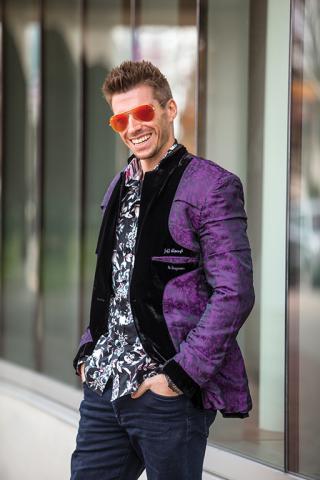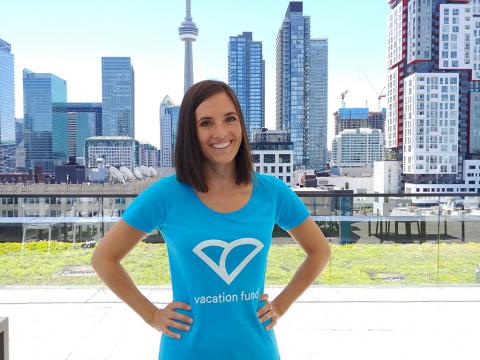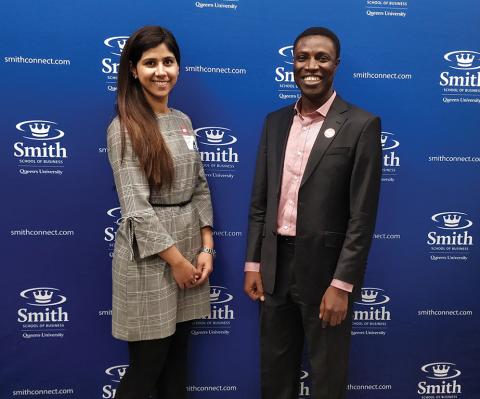StartUps Snapshot 2019
Jeff Alpaugh Custom
How did Jeff Alpaugh, MMIE’18, decide to create the world’s most dangerous dress shirts? It’s a story that includes a suit-shopping trip gone awry, a hot TV show, the army, and a lively bus stop in Vietnam where, Alpaugh recalls, “this guy was wearing the sweetest shirt you ever saw!”
Alpaugh and his wife, Emilee, are owners of Jeff Alpaugh Custom. They sell custom-designed and tailored dress clothes for men and women. The company’s specialty is ultra-colourful, patterned shirts billed as “the world’s most dangerous dress shirts.” Jeff and Emilee have a shop in Fredericton, and they sell around the world via jeffalpaugh.com. Customers can design their own shirts or choose from existing patterns with far-out names such as “the Brazilian Mobster”, “Squirrel Bait” and “the Strawberry Milkshake”.
“It makes no sense to wear a plain blue shirt,” Alpaugh says. “When you wear a shirt that is outrageous, but dignified at the same time, you become very approachable. You have a certain energy. People always want to know why I’m so pumped. I’m pumped because everywhere I go, people just assume I’m an awesome guy.”
Jeff Alpaugh grew up in Toronto and Vancouver. One day, his dad took him to buy a suit to wear to job interviews. The suit that the salesman sold Alpaugh would have been perfect for a man of, say, 225 pounds. Alas, young Jeff was only about 145 pounds. Given the mis-measure of the man, job offers did not come his way…until a manager at a Moore’s clothing store saw promise underneath that baggy suit. “He told me to come back the next day and they’d get me into a better suit. When I put it on, I felt amazing. I became an evangelist. When people came into the store, I’d teach them how to dress.”
Alpaugh studied business at Wilfrid Laurier University in Waterloo, Ont. The same year he graduated, in 2007, the war in Afghanistan was heating up. Alpaugh immediately applied to the Canadian Forces and joined the army the following year. He remained an infantry officer until January of this year.
A few years ago, Alpaugh thought about what he might do after the army. He recalled working at Moore’s and, later, at the upscale Canadian men’s clothier Harry Rosen. Alpaugh loved helping guys find their ideal look. Many didn’t mind plunking down a few hundred dollars for a perfect-fitting shirt. They looked good and felt great.
Alpaugh also noticed that a lot of guys didn’t want to wear the same dress shirt as everyone else. They wanted more bling. Often that meant a plain white shirt with a hint of bright paisley inside the collar or under the cuff. Alpaugh wondered: Why not make the entire shirt an eye-catching design? Jeff Alpaugh Custom was born.
A trip to Vietnam, meanwhile, provided the perfect slogan. “My wife and I were at a bus station, and you can imagine how colourful a bus station in Vietnam is. There were people everywhere, and this guy gets off a bus, and he’s wearing this amazing shirt. He has this aura about him. I said, ‘Dude, that’s the most dangerous dress shirt I’ve ever seen in my life.’ ”
In 2017, as the business began to ramp up, Alpaugh enrolled in Smith’s Master of Management Innovation and Entrepreneurship program. “I knew a lot about dress clothes. But I didn’t know that much about starting a business.” That fall, he and Emilee appeared on the CBC show Dragons’ Den. Their pitch was electric. Even the Dragons who weren’t keen to own a piece of a dress-shirt business seemed impressed. “I would invest in you in a heartbeat,” Jim Treliving, the chairman of Boston Pizza, told Alpaugh on the show.
Since the appearance on Dragons’ Den, Alpaugh notes that interest in Jeff Alpaugh Custom has shot up. Today, the company sells not only dress shirts but also suits, socks, jackets and accessories such as ties and cufflinks. The Fredericton store recently moved to a larger location and Alpaugh says he’s looking to open a second store, possibly in Waterloo, Ont., later this year.
His long-term goal? To eventually have stores in major Canadian and American cities. It’s a bold objective…one that the guy behind the most dangerous shirts seems ready to conquer.
Vacation Fund
In January 2017, Erica Pearson, BCom’14, started Vacation Fund as a way to help people save for holiday travels. A year later, she changed her strategy: Rather than cater to individuals, she decided to work directly with companies in order to help their employees save for vacations. The result: increased growth for the Toronto-based startup. We caught up with Pearson, Vacation Fund’s CEO (and recipient of the 2018 Valerie Mann, BCom'86, Dare to Dream internship), to see how her venture is evolving.
How did you come up with the idea for Vacation Fund?
I saw people joining bucket-list platforms. People were laying out all the trips they wanted to take in their life, and I thought, ‘Well, that's great, but if you're not working towards those goals, then what's the point?’
My dad was a big inspiration, too. When I was growing up, he wouldn't spend money. He was very frugal. [But] he took our family on three trips a year. By the time I turned 22, I'd been to over 40 countries. I look back now and think that was about as incredible a childhood as I possibly could have asked for. People have started to catch on to this idea that experiences make you happier than stuff does.
How does Vacation Fund work?
Vacation Fund is an employer-matched travel savings program. It allows employees to direct a portion of their paycheque into a separate vacation-fund account. Companies match a portion of their employees’ contributions and pay us a subscription fee based on the company’s size.
Vacation Fund may be one of the few benefits that smaller companies offer. And for some larger companies, it may replace another employee benefit. The feedback we keep getting is that this is one of the few benefits applicable to 100 per cent of the employee base, regardless of age, gender, income bracket or marital status. No matter who you are, you are expected to take some time off.
You initially targeted individuals, then switched to marketing to companies as an employee benefit. Why the change?
We started asking our users what prevents them from going on vacation, and 50 per cent said, ‘I don't have the budget,’ and the other 50 per cent said, ‘I don't think my boss wants me to take time off.’ Around that time, I was pitching to tech CEOs in Toronto. They started asking if they could put money towards their employees’ vacation funds to show them that they actually expect them to take time off. It was just kind of a perfect storm of both sides telling us that Vacation Fund needed to be an employee benefit.
How has the shift impacted your business?
We started receiving far more interest. We started a test run with six smaller companies in 2018, and now we are in the process of onboarding a 300-person fintech company in Toronto. More and more companies are paying attention, and we’ve been getting inquiries from as far away as Germany, as well as across the U.S. and Canada.
What’s next for Vacation Fund?
By early 2020 we would like to have almost 20,000 employees using our platform. That will involve a few bigger companies coming on board. Our goal is to do some integrations with payroll providers, so that smaller companies can take advantage of more of a self-serve onboarding experience, and then focus our efforts on converting medium- and large-enterprise leads.
Longer term, we would like to see a version of the platform that helps people estimate their trip costs and choose a contribution amount that makes sense based on the kinds of trips they want to go on. We see a lot of opportunity around knowing people’s travel goals, showing them offers that are aligned with those goals, and making some commission on the travel side.
1 Million Teachers (1MT)
When Hakeem Subair co-founded 1 Million Teachers with fellow MMIE’17 grad Rizma Butt (left), he had a big goal: to improve the quality of teachers in sub-Saharan Africa. Here, he explains the business, how it got started and why better teachers make the world better.
One Million Teachers (1MT) is a reward-based teacher development program. From a learning portal that is optimized for mobile, teachers can engage in accessible, high-quality professional development modules. An online learning community that enables the sharing of knowledge and experiences helps to complement the learning platform.
In 2008, my wife and I were looking for an appropriate place to leave our daughter, Nadrah, while we were at work. We were not satisfied with what we found available in terms of schools where we lived in Nigeria. So we decided to open our own school. What started with a handful of friends’ children quickly blossomed into a 192-student enterprise. The school was thriving except for one issue: the teachers. While our school was considered one of the best, we still had trouble securing good teachers. I could only imagine the state of other schools. I learned that most public-sector teachers weren’t paid well, and that many only chose to stay in the profession because they had nowhere else to go.
I came to Canada in March 2012. But education back in Nigeria remained in my thoughts. I eventually enrolled in the Master of Management Innovation and Entrepreneurship program at Smith, and with the help of Program Director Shari Hughson and Tina Dacin, Director of the Centre for Social Impact at Smith, began to develop an idea to tackle the issue of poor teacher training. I returned to Nigeria in December 2016 to do some additional market research. My conclusions were corroborated by what stakeholders and researchers all agree on: The most significant resource for transforming education is to transform the teacher. An investment in teachers brings the most return on education. And so 1 Million Teachers was born.
The most fun I’ve had so far was when I travelled to Ghana and Ivory Coast last March and April with teacher candidates from Queen’s University as part of our partnership agreement with the school’s Faculty of Education. During the trip, the teachers worked in various schools, initially as observers and eventually teaching classes. Towards the end, they designed and delivered workshops for the teachers of the schools they visited.




